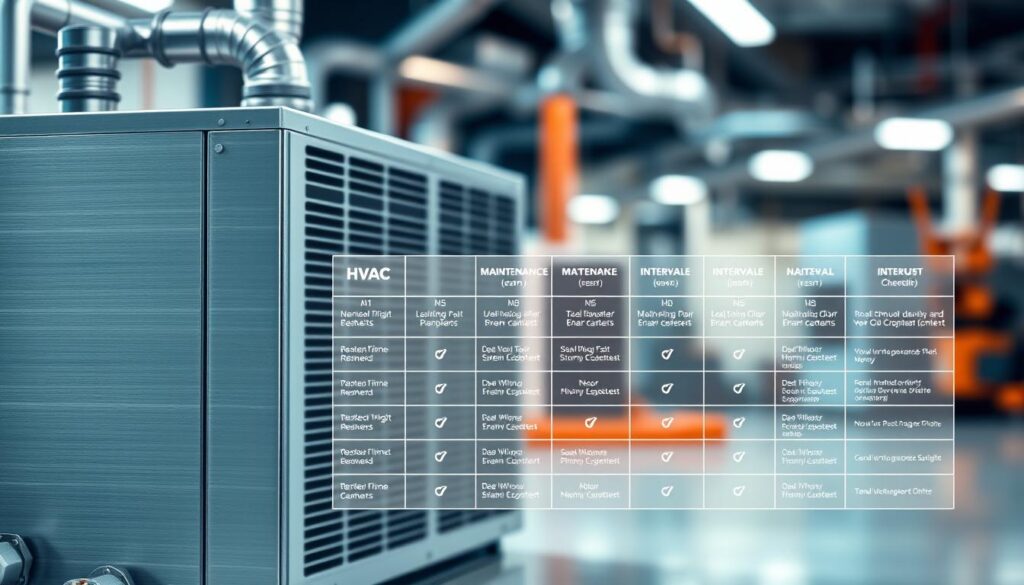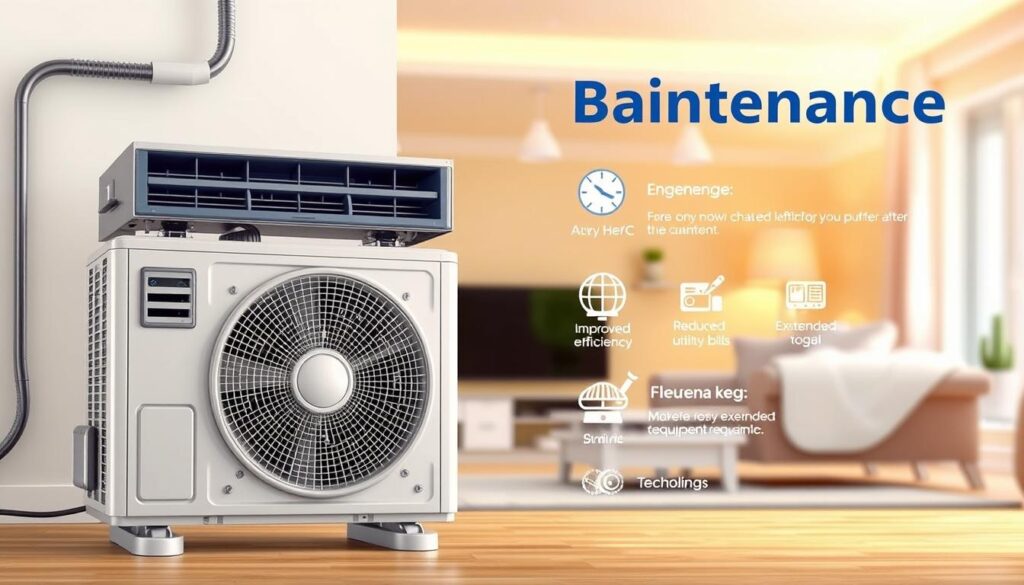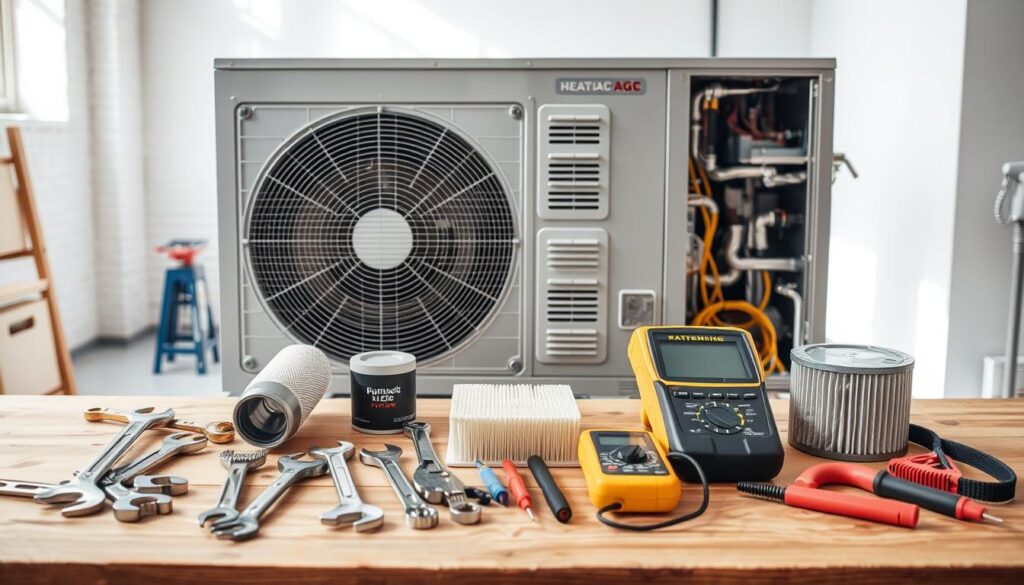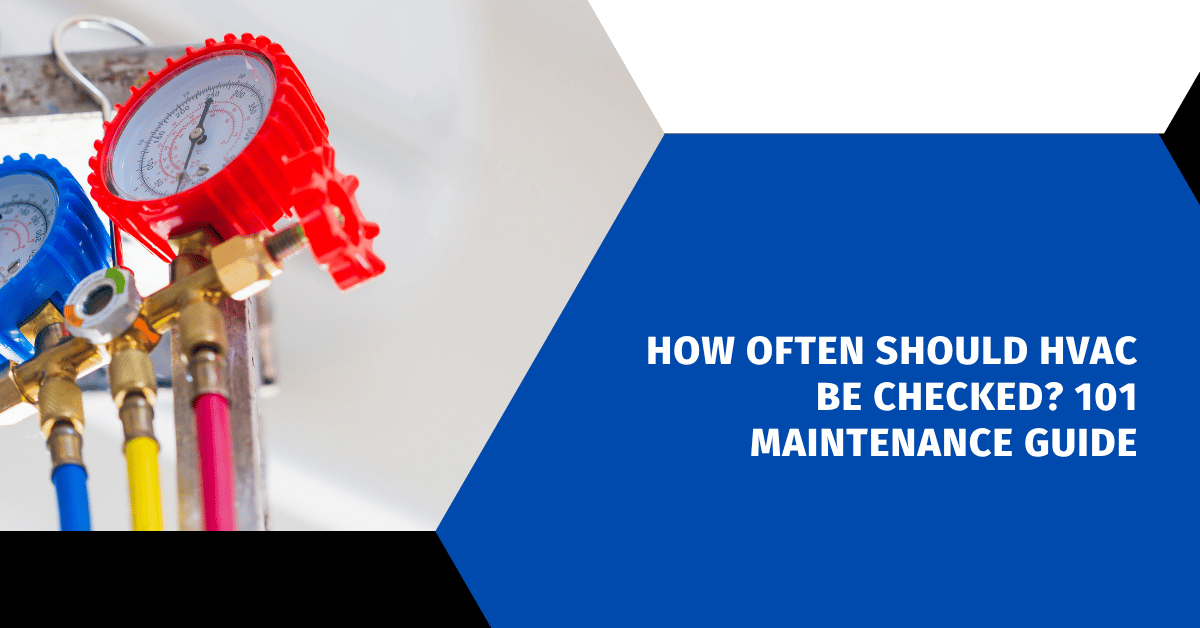Affiliate Disclosure
HVAC Guide Guys is a participant in the Amazon Services LLC Associates Program, an affiliate advertising program designed to provide a means for sites to earn advertising fees by advertising and linking to Amazon.
How Often Should HVAC Be Checked? Ever thought about keeping your home’s heating and cooling system in top shape? Knowing when to check your HVAC can save you a lot of money and keep your home comfy.

Your HVAC system works hard to keep your home just right. But, many people forget to keep it maintained. Knowing when to check your HVAC can stop big problems and make it last longer.
Experts say you should check your HVAC at least once a year. Some even suggest doing it twice a year to catch issues early. This guide will help you understand how to keep your heating and cooling system running well.
Key Takeaways
- Annual HVAC inspections are key for good performance
- Regular care stops sudden breakdowns
- Professional tune-ups save energy
- Each HVAC system needs its own care plan
- Looking after your system can make it last longer
Table of Contents
Understanding HVAC Maintenance Basics
Regular hvac system checkups are key to a comfortable and efficient home. Your HVAC system needs regular care to work well and avoid sudden failures. It’s like a health check for your home’s heating and cooling.
During a typical hvac preventive maintenance visit, technicians check several important areas:
- Inspecting electrical connections
- Cleaning critical system components
- Checking refrigerant levels
- Lubricating moving parts
- Testing system performance
The main aim of preventive maintenance is to protect your investment. Regular check-ups can extend your HVAC system’s lifespan by years, cutting down on expensive repairs and sudden replacements.
Professional technicians will carefully look at your system’s main parts, including:
- Condenser and evaporator coils
- Air filters
- Blower motor
- Thermostat calibration
- Ductwork integrity
Knowing these maintenance basics helps you manage your home’s comfort system well. It keeps you from facing costly problems later on.
Explore Our HVAC Shop
Looking for top-rated HVAC tools, parts, and accessories? Visit our shop and find the perfect solution for your needs.
Visit the ShopRecommended HVAC Inspection Frequency
Keeping your HVAC system in top shape is all about planning and timing. Knowing when to check your HVAC can avoid expensive repairs and keep it running smoothly all year.
Experts say a good maintenance plan changes with the seasons and your system’s needs.
Spring Maintenance Checklist
Spring is the time to get your AC ready for the heat. You should:
- Clean the air conditioning coils
- Check the refrigerant levels
- Look over the electrical connections
- Make sure the thermostat works right
Fall Service Requirements
When fall comes, it’s time to get your heater ready for winter. You need to:
- Check the heating elements
- Lubricate any moving parts
- Clean the burners and heat exchangers
- Check for carbon monoxide
Emergency Inspection Scenarios
Some problems need quick help, like:
- Strange noises when it’s running
- Temperature not staying steady
- Big jumps in your energy bills
- Frost or ice on the system
| Season | Maintenance Focus | Recommended Frequency |
|---|---|---|
| Spring | Cooling System | Annual Pre-Summer Inspection |
| Fall | Heating System | Annual Pre-Winter Service |
| Emergency | System Troubleshooting | As Needed |
Regular maintenance is essential for a long-lasting HVAC system and better energy use.
Essential Components of HVAC System Checkups
Understanding the key parts of HVAC system checkups is vital for keeping your system running well. Professional HVAC unit inspections do more than just look at the surface. They dive deep into the complex systems that make your home comfortable.
During a detailed HVAC inspection, technicians focus on several important areas:
- Electrical Connection Analysis
- Moving Parts Lubrication
- Condensate Drain Evaluation
- Refrigerant Level Verification
- Thermostat Calibration
Each part is essential for your system’s efficiency. Electrical connections, for example, are carefully checked to avoid short circuits or system failures. Technicians will check and tighten connections to ensure safe and smooth operation.
| HVAC Component | Inspection Focus | Potential Issues Detected |
|---|---|---|
| Electrical Connections | Tightness and Corrosion | Potential Short Circuits |
| Moving Parts | Lubrication and Wear | Friction and Efficiency Loss |
| Condensate Drains | Blockage and Flow | Water Damage Risk |
Regular HVAC upkeep through professional inspections can greatly extend your system’s life and save you money on repairs. By fixing small issues early, you protect your investment and keep your home comfortable.
Explore Our HVAC Shop
Looking for top-rated HVAC tools, parts, and accessories? Visit our shop and find the perfect solution for your needs.
Visit the ShopHow Often Should HVAC Be Checked Throughout the Year
Keeping your HVAC system in top shape needs a smart plan. This plan changes with the seasons, weather, and how old your system is. Your maintenance schedule is not one size fits all. It’s a custom plan for your needs.
Knowing when to check your HVAC depends on a few key things. These things affect how well your system works and how long it lasts.
Seasonal Maintenance Timeline
Good HVAC maintenance follows a seasonal pattern:
- Spring: Get ready for cooling with an AC tune-up
- Summer: Check your system’s performance mid-season
- Fall: Get your heating system ready
- Winter: Keep an eye on your heating
Climate Impact on Service Frequency
Your local weather greatly affects how often you need maintenance. Places with very hot or cold weather need more checks.
| Climate Type | Recommended Annual Checks | Key Considerations |
|---|---|---|
| Mild Climate | 2 times/year | Standard maintenance routine |
| Extreme Heat/Cold | 3-4 times/year | Intensive system stress |
| Coastal/Humid Areas | 4 times/year | Salt, moisture, corrosion risks |
Age-Based Maintenance Schedules
Your HVAC system’s age affects its maintenance needs:
- New systems (0-5 years): Annual check by a pro
- Mid-age systems (5-10 years): Check twice a year
- Older systems (10+ years): Check every 3 months
By following these guidelines, you’ll keep your system running smoothly. You’ll avoid sudden breakdowns and make your HVAC last longer.
Air Filter Maintenance and Replacement Intervals
Keeping your HVAC air filters clean is key to your system’s health. It affects how well your system works and the air you breathe indoors. Regularly changing filters helps your system run smoothly and avoids damage.
How often you need to replace your air filters depends on a few things:
- Home environment and air quality
- Number of occupants
- Presence of pets
- Local pollution levels
Here are some general guidelines for filter replacement:
- Fiberglass filters: Replace every 30 days
- Pleated filters: Replace every 60-90 days
- High-efficiency filters: Replace every 6-12 months
If your home has unique needs, like allergies or pets, you might need to change filters more often. For example, if you have allergies or live in a dusty area, consider changing your filter every 20-45 days.
Pro tip: Set calendar reminders or use smart home technology to track your filter replacement schedule and maintain optimal HVAC performance.
Explore Our HVAC Shop
Looking for top-rated HVAC tools, parts, and accessories? Visit our shop and find the perfect solution for your needs.
Visit the ShopProfessional HVAC Tune-Up Benefits
Getting professional HVAC tune-ups can really change how comfortable your home is. Regular maintenance does more than just fix problems. It offers big benefits that keep your heating and cooling system running well and save you money over time.

Experts say routine maintenance is key. By getting tune-ups regularly, you get many benefits for your home’s comfort system.
Energy Efficiency Improvements
How often you get your HVAC tuned up is important. A well-kept system can use up to 15% less energy. This means you’ll pay less for utilities.
- Cleaned and calibrated parts work better
- Less energy waste means better system performance
- Better airflow and temperature control
System Longevity Benefits
Regular maintenance can make your HVAC last longer. It finds and fixes small problems before they get big. This means you avoid expensive repairs or new system costs.
- Small issues are caught early
- Less wear and tear on important parts
- Keeps warranty requirements met
Cost Savings Analysis
Even though maintenance costs a bit, it’s worth it. A tune-up is cheap compared to emergency repairs or replacing the whole system.
Preventive maintenance can save homeowners up to 30% on repair costs.
Investing in professional HVAC tune-ups does more than just keep your equipment running. It keeps your home comfortable, efficient, and saves you money.
Specific Maintenance Requirements for Different HVAC Types
Your HVAC system needs different care based on its type. Knowing these needs is key to keeping your home comfy and your unit efficient during maintenance.
Different HVAC systems need special care during inspections. Let’s look at what each system type requires:
- Split Systems: Need biannual checks by pros, focusing on refrigerant and electrical connections
- Heat Pumps: Need checks every three months because they run all year
- Ductless Mini-Splits: Need air handler cleaning and filter upkeep
- Geothermal Systems: Need underground loop checks and fluid level monitoring
Each HVAC type has its own maintenance hurdles. Manufacturers give specific care tips. Homeowners should follow these to keep their systems running well and avoid failures.
Professional technicians say to check your system’s manual for the right maintenance steps.
Ignoring specific maintenance can cause your system to work less efficiently. This can lead to higher energy bills and even early system failure. By focusing on the right maintenance, you can make your HVAC last longer and work better.
Signs Your HVAC Needs Immediate Attention
Your HVAC system sends out warning signs that you can’t ignore. Knowing these signs helps avoid expensive repairs and keeps your system running well. Spotting problems early can prevent big breakdowns and damage to your heating and cooling system.
Critical Warning Signals to Watch
Knowing what to look for is key to good HVAC maintenance. Here are the top warning signs that mean you need to act fast:
- Unusual noises like grinding, squealing, or banging
- Inconsistent temperatures throughout your home
- Weak or reduced airflow from vents
- Unexplained increases in energy bills
- Persistent strange odors when system runs
Performance Issues to Monitor
Some problems might seem small but can hide bigger issues. Keep an eye out for these signs:
| Performance Issue | Potential Cause | Recommended Action |
|---|---|---|
| Frequent cycling | Thermostat malfunction | Professional inspection |
| Uneven cooling/heating | Ductwork problems | Comprehensive system check |
| Excessive humidity | System inefficiency | Immediate maintenance |
Early detection can save you from costly repairs and make your HVAC last longer. If you’re unsure, get a professional to check your system’s health.
Explore Our HVAC Shop
Looking for top-rated HVAC tools, parts, and accessories? Visit our shop and find the perfect solution for your needs.
Visit the ShopDIY Maintenance Tasks vs Professional Service

Knowing when to do DIY hvac upkeep and when to call a pro can save you money and time. Some tasks are easy for homeowners to do. Others need special skills.
Homeowners can handle some routine maintenance tasks with confidence:
- Replacing air filters every 1-3 months
- Cleaning outdoor unit surroundings
- Checking thermostat settings
- Inspecting visible ductwork for obvious damage
Critical maintenance tasks, on the other hand, need a pro’s touch. These tasks require special knowledge and tools:
- Electrical system diagnostics
- Refrigerant level checks
- Comprehensive system performance evaluations
- Internal component cleaning and lubrication
Professional technicians offer more than just repairs. They can spot issues early, saving you money. They make sure your HVAC system works its best.
Knowing what you can do yourself and when to get help is key. It keeps your home comfortable and saves your investment.
Cost Considerations for Regular HVAC Maintenance
Understanding the cost of HVAC maintenance is key to smart decisions. Regular maintenance might seem expensive upfront. But, it can save you money in the long run.
When thinking about hvac tune-up intervals, consider both short-term and long-term costs. Regular maintenance stops costly breakdowns. It also keeps your system running efficiently.
Service Contract Options
Many HVAC companies offer service contracts to manage costs. These contracts include:
- Annual system inspections
- Priority for repairs
- Discounted repair rates
- Warranty extensions
Long-term Financial Benefits
Proactive maintenance offers big financial benefits. Here are some savings you might see:
| Maintenance Action | Potential Annual Savings |
|---|---|
| Regular filter replacement | $50-$100 |
| Annual professional tune-up | $100-$300 in energy costs |
| Preventing major repairs | $500-$2,000 |
Investing in regular maintenance can save you thousands of dollars. It ensures your HVAC system works well and keeps you comfortable.
Explore Our HVAC Shop
Looking for top-rated HVAC tools, parts, and accessories? Visit our shop and find the perfect solution for your needs.
Visit the ShopPreventive Maintenance Strategies for Extended HVAC Life
Keeping your HVAC system in top shape is more than just fixing it when it breaks. Smart homeowners know that regular maintenance is key. It helps your system work better and last longer.
Effective hvac preventive maintenance includes several important steps:
- Regular cleaning of air filters and system parts
- Scheduling professional checks twice a year
- Keeping air flowing well around indoor and outdoor units
- Fixing small problems before they get big
Your HVAC system needs regular care. Proactive maintenance can cut down on breakdowns by up to 95%. This saves you money and avoids sudden problems.
“An ounce of prevention is worth a pound of cure” – this saying is very true for complex HVAC systems.
Important maintenance steps are:
- Cleaning air ducts every year
- Checking refrigerant levels
- Lubricating moving parts
- Inspecting electrical connections
By spending time and a little money on regular maintenance, you’ll make your system last longer. You’ll also save on energy and keep your home comfortable.
Conclusion
Knowing how often to check your HVAC is key for a comfy and efficient home. Regular checks prevent sudden breakdowns and keep your system running well. Your maintenance plan should fit your system, climate, and home.
It’s not just about yearly checks. Each system needs special care, based on its age, how much you use it, and the weather. By keeping up with maintenance, you can cut down on repair costs and boost efficiency.
Acting now can save you a lot of money and stress later. Get a professional HVAC check with a certified tech who knows your system. Remember, regular maintenance is cheaper than fixing or replacing a broken system.
Your home’s comfort and energy use depend on a good HVAC system. Begin today with a detailed maintenance plan. This will protect your investment and keep your family comfortable all year.

